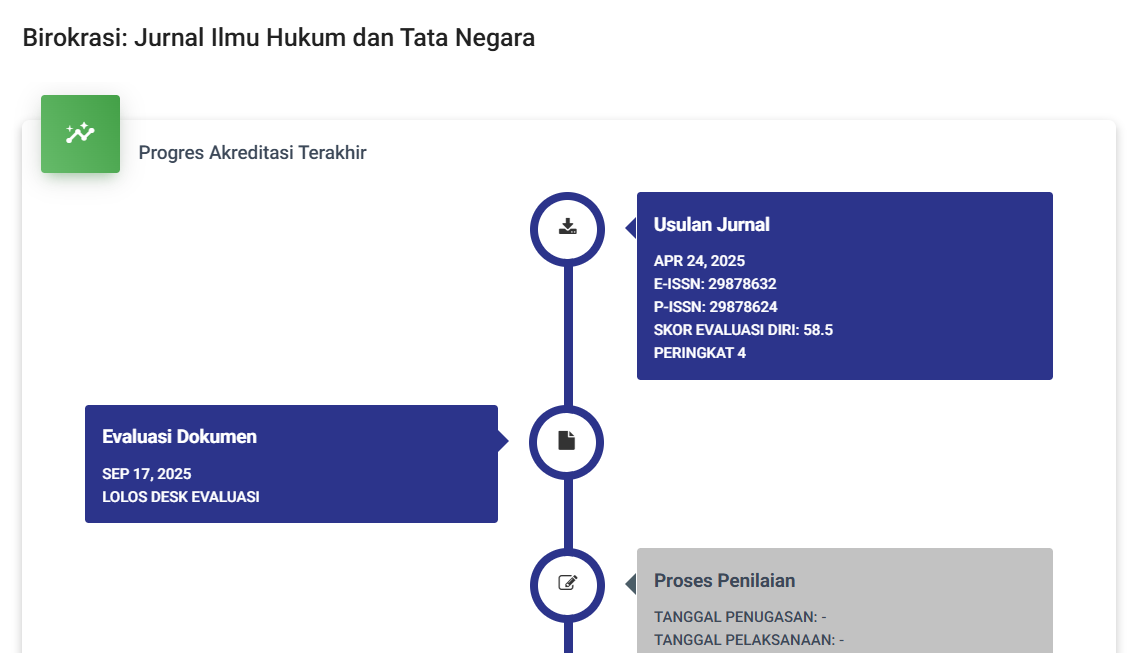Penerapan Sumber Daya Manusia Dalam Meningkatkan Motivasi Kerja ASN
DOI:
https://doi.org/10.55606/birokrasi.v2i3.1329Keywords:
SDM, Motivation, ASNAbstract
This study aims to explore the application of human resource management (HRM) strategies in improving the work motivation of the State Civil Apparatus (ASN). ASN work motivation is a critical factor that affects the performance of government organizations, the efficiency of public services, and the achievement of national strategic goals. In this context, various aspects of HR management such as recruitment, training and development, performance appraisal systems, and provision of incentives and rewards are identified as key factors that can increase ASN work motivation. This research methodology uses a qualitative approach through literature studies. The results showed that transparent and meritocracy-based recruitment, continuous training, and a fair and objective performance appraisal system are very influential in increasing ASN work motivation. In addition, the provision of appropriate incentives and rewards for work achievements has also proven effective in encouraging ASN enthusiasm and productivity. This study also revealed that a conducive work environment and inspirational leadership play an important role in building ASN's intrinsic motivation. The conclusion of this study confirms that strategic and integrated HR management is key to improving ASN work motivation, which in turn will contribute to improving the quality of public services and the effectiveness of government organizations. Practical recommendations from this study include the implementation of more inclusive HR policies, development of training programs relevant to ASN needs, and improvement of performance-based reward and incentive mechanisms. This research provides valuable insights for policymakers and HR managers in an effort to strengthen ASN motivation and performance in Indonesia.
References
Arikunto, (2015). Prsedur Penelitian Suatu Pendekatan Praktik. Jakarta : Rineka Cipta.
Asri, S. (2015). Pengembangan Sumberdaya Manusia dalam Meningkatkan Kualitas Pelayanan dan Kepuasan Pelanggan (Studi pada Aparatur Pemerintah Provinsi Kalimantan Timur). JAM, 13.
Azas, A. I., Romadhoni, B., & Tamsah, H. (2019). Pengaruh Motivasi Kerja, Kompensasi dan Pelatihan terhadap Kinerja Pegawai pada Rektorat UIN Alauddin Makassar.
Bangun, W. (2016). Manajemen Sumber Daya Manusia. Erlangga.
Barus, H. B. (2018). Pengaruh Pendidikan dan Pelatihan terhadap Kompetensi Pegawai di Sekretariat Dinas Bina Marga dan Bina Konstruksi Provinsi Sumatera Utara [Universitas Meda Area]. In http:/repository.uma.ac.id/. https://doi.org/10.20961/ge.v4i1.19180
Bayu Krisdianto, N. (2017). Pengaruh Pengembangan Sumber Daya Manusia Dan Motivasi Terhadap Kinerja Pegawai Dinas Pariwisata Kota Batu. JIMMU, II/Nomor 2.
Handoko, T. Hani. (2014). Manajemen Personalia dan Sumber Daya Manusia. PBFE Yogyakarta.
Hartono, B. (2015). Pengembangan Sumber Daya Manusia: Studi Implementasi Kebijaksanaan Diklat Penjenjangan Aparatur Pemerintah Daerah Sleman. Jurnal Ilmu Manajemen Dan Akuntansi.
Hasibuan, Malayu S.P. (2017). Manajemen Sumber Daya Manusia. Edisi Revisi. Jakarta : Bumi Aksara.
Heni, Silvia. (2021). Analisis Kinerja Pegawai Negeri Sipil (PNS) Pada Biro Organisasi Sekretariat Daerah Provinsi Riau. Riau.
Jackson, R. M. J. (2002). Manajemen Sumber Daya Manusia. Salemba Empat.
Mahfud, MD. (2019). Hukum Kepegawaian Indonesia.Yogyakarta
Marquardt, M. J. (1996). Building the learning organization: A systems approach to quantum improvement and global success.
McGraw-Hill Companies. Priansa, D. J. (2014). Perencanaan & Pengembangan SDM. Alfabeta. Price. (2011). Human Resource Development. Education Ltd.
Rao, T. . (1996). Penilaian Prestasi Kerja: Teori dan Praktek. Pressindo.
Robbins, Stephen P. (2016). Perilaku Organisasi. Edisi 16. Jakarta : Salemba Empat
West, M. A. (2000). Developing Creativity In Organizations. Kanisius
YUME : Journal of Management, 2(1)








